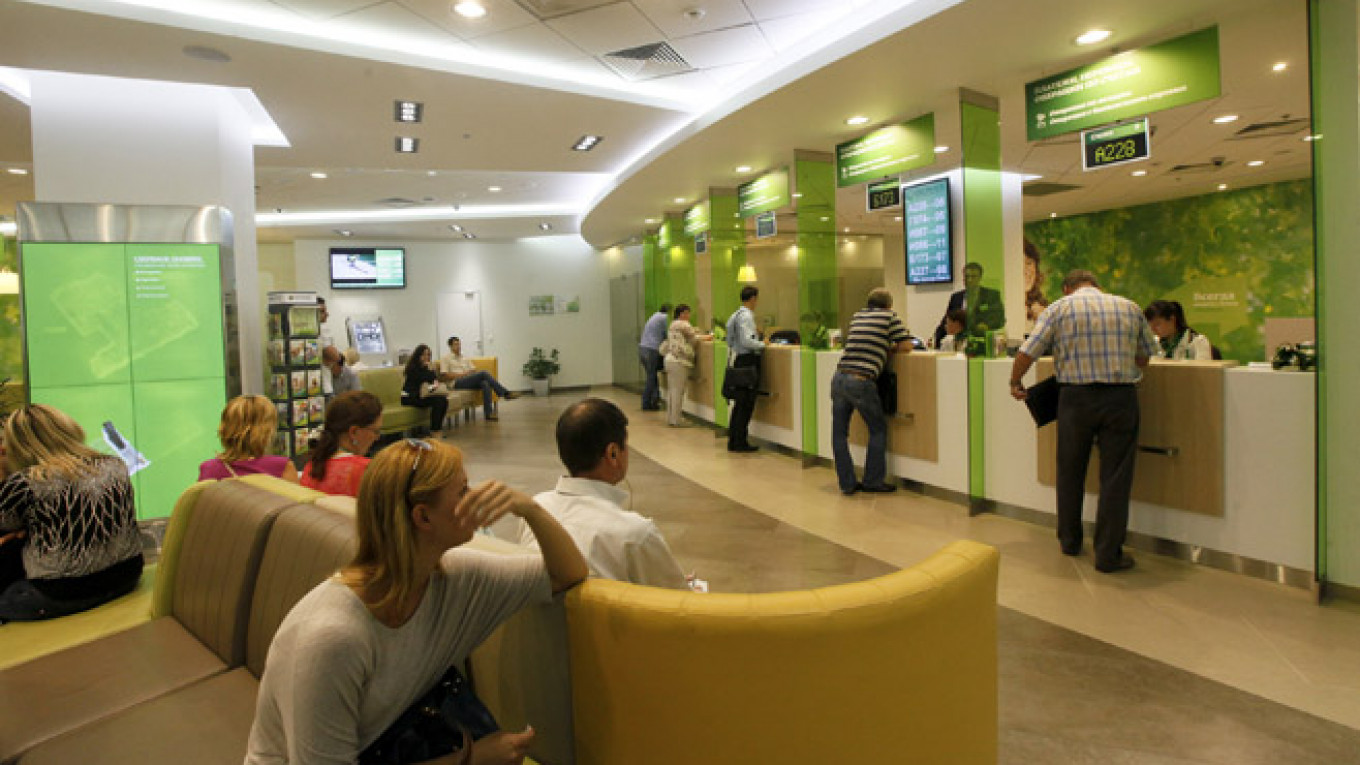LONDON — An easing in sanctions-related tension with the West is allowing Russian companies to explore global bond markets after a four-month hiatus, but they must prepare to pay up to lure investors.
After bond buyers last week shrugged off concerns about militant attacks in Kenya and Ecuador's serial defaults, it seems unlikely that bond issues from Russia's mighty state-run companies can fail.
In fact, privately owned Alfa Bank had already broken the lull in issuance earlier this month with a 350 million euro ($475 million) deal that was more than three times subscribed.
But this week's offering from Russia's biggest lender Sberbank could be the one that really unleashes a flood of pent-up bond issuance, including from state-run companies that until recently looked set to bear the brunt of Western sanctions imposed in retaliation for Russia's annexation of Crimea.
Sberbank raised 1 billion euros in five-year bonds, receiving orders for double that amount. That might pale in comparison with, say, Kenya which took orders of almost $9 billion for a $2 billion bond, but is pretty healthy for what would almost have been a pariah credit a few months back.
"Demand is hot in the asset class and there is always a price for everything, so if the Russians are willing to pay they can get deals done," said Max Wolman, a fund manager at Aberdeen Asset Management. "People also feel now there is not much threat of sanctions from Europe."
A European Union foreign ministers' meeting on Monday revealed there is little concerted support for tougher sanctions on Russia, which supplies energy to much of the bloc.
And Sberbank was indeed willing to pay 3.35 percent for five-year euro cash, equating to a 20 plus-basis-point premium over its 2019 dollar bond based on spreads over mid-swaps, the benchmark used for calculating the total cost of issuing a bond.
That contrasts with many other Russian issuers, whose euro debt offers no spread premium over dollar bonds.
Sberbank also paid a decent premium over the euro issues of other state-run lenders such as Gazprombank and VEB.
"I calculate the premium [on Sberbank's dollar issue] as 40 bps on a spread basis, which I think is sufficient and second, oversubscription ratios tend to be lower in euros than for dollar new issues," Jefferies analyst Richard Segal said.
"Third, there have not been many euro-denominated bonds from Russian banks, but one comparison is Gazprombank, where on a like-for-like basis there is 15 bps extra spread in dollars."
Gazprombank is meeting investors this week. The vice-chairman of VEB, Alexander Ivanov, said the bank wanted to see what reception its peers got before embarking on its own deal.
Recovery But Problems
Russian companies face about $150 billion in debt payments in 2014, but with half the year gone, they have raised just $6 billion on bond markets, Thomson Reuters data shows, less than a quarter of year-ago levels.
But two factors are on their side.
First, Russian assets have recovered strongly in the past month as prospects of full-fledged war with Ukraine and crippling U.S. sanctions have receded.
Second, with U.S. yields about 40 bps below end-2013 levels and the Federal Reserve in no hurry to raise interest rates, any asset that provides an extra few basis points of yield will be popular, whether a junk-rated euro credit such as Cyprus or a first-time frontier issuer such as Kenya.
On the other hand, U.S. sanctions risk has not entirely abated, meaning firms may be restricted to euro issues where the investor base tends to be smaller than the dollar market.
"Russia is something we are treading carefully with," said Angus Halkett, a portfolio manager at Stone Harbor, a U.S. fund which has little exposure to Russian corporate debt.
"Any entity that's not a sovereign but is close to the sovereign could be implicated if there is an escalation of sanctions," Halkett said of companies such as Sberbank.
No Longer Attractive
And finally there are many investors, U.S. or European, who want to have nothing to do with Russian debt simply because they no longer view Russia as an attractive story.
French asset manager Carmignac Gestion has slashed exposure to Russian company and bank debt and has no plans to raise it, says Sandra Crowl, a member of the investment committee.
"To go into Russian corporate debt would mean we were confident in two things — the Russian banking system and the disclosures we are getting from Russian companies," Crowl said.
"But we are not [confident]. Russia has been through extensive credit expansion and non-performing loans are going to rise."
With the economy and foreign investment unlikely to grow this year, interest rates up 200 bps and Ukraine-related losses racking up, profits have plunged at major banks. Sberbank, for instance, posted an 18-percent fall in net first-quarter income.
VTB's first quarter profits fell a whopping 80 percent and provisions for bad loans more than doubled.
"Given the risk of sanctions is also a consideration, our exposure to Russian corporate debt is near zero and we do not have any inclination to increase that," Crowl said.
See also:
Finance Ministry Says Russia Yet to Get Ukraine's $73.3M Eurobond Payment
A Message from The Moscow Times:
Dear readers,
We are facing unprecedented challenges. Russia's Prosecutor General's Office has designated The Moscow Times as an "undesirable" organization, criminalizing our work and putting our staff at risk of prosecution. This follows our earlier unjust labeling as a "foreign agent."
These actions are direct attempts to silence independent journalism in Russia. The authorities claim our work "discredits the decisions of the Russian leadership." We see things differently: we strive to provide accurate, unbiased reporting on Russia.
We, the journalists of The Moscow Times, refuse to be silenced. But to continue our work, we need your help.
Your support, no matter how small, makes a world of difference. If you can, please support us monthly starting from just $2. It's quick to set up, and every contribution makes a significant impact.
By supporting The Moscow Times, you're defending open, independent journalism in the face of repression. Thank you for standing with us.
Remind me later.






